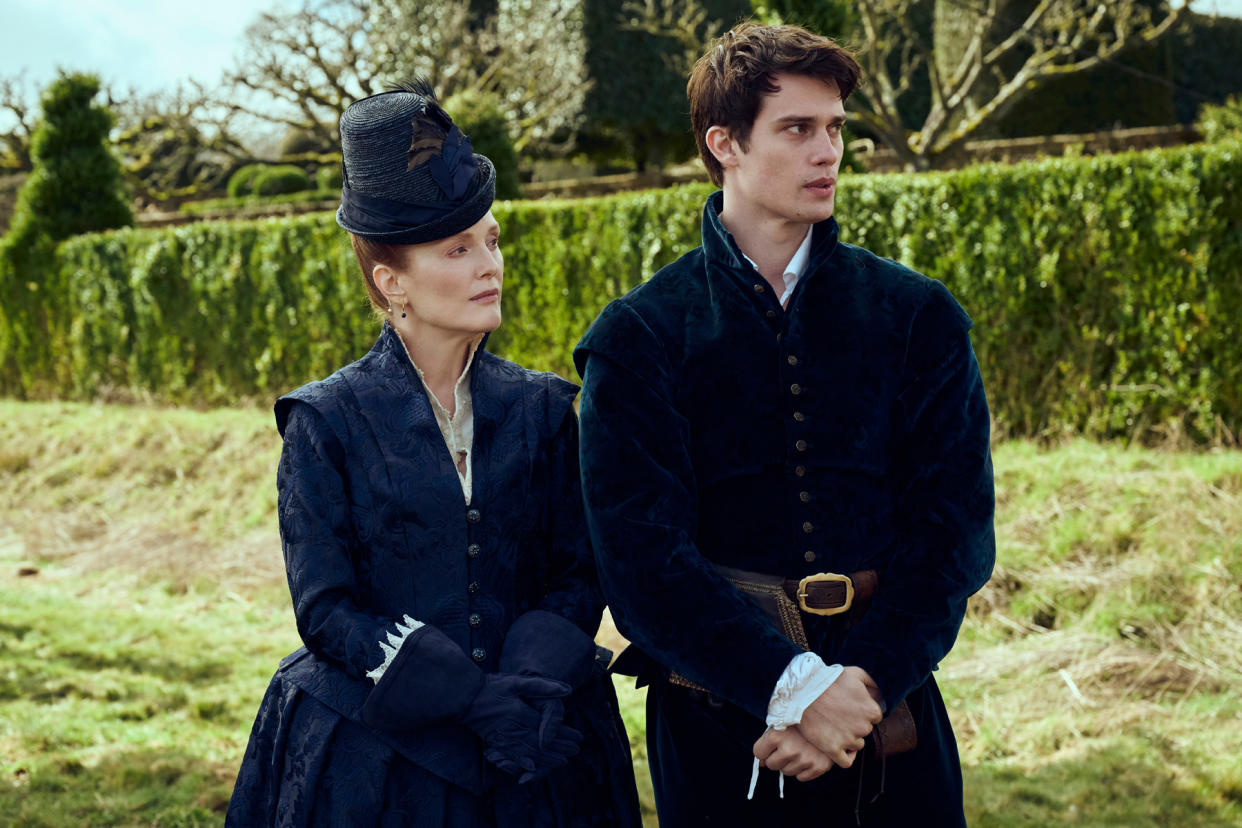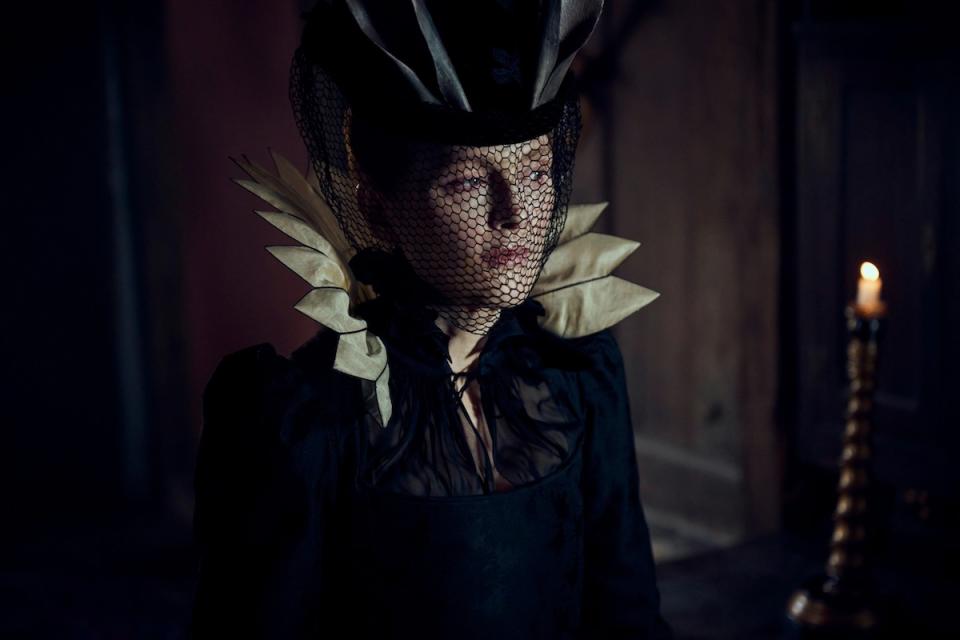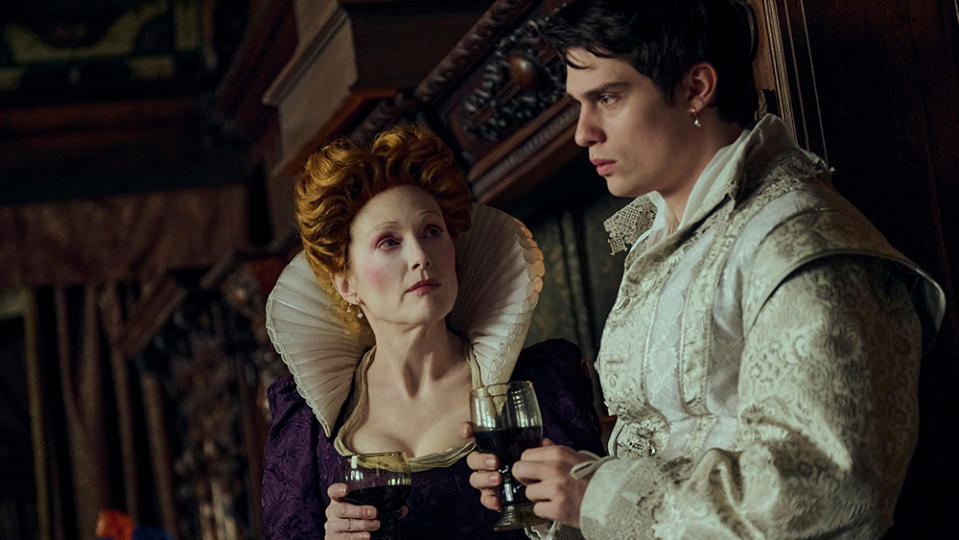Julianne Moore Couldn’t Resist the Scheming Mother in ‘Mary & George’

Julianne Moore seems to be having a blast in limited series “Mary & George” (Starz). But carrying a seven-part period royal dramedy is not easy. The Oscar-winning film actress (“Still Alice”) rarely does television (“Lisey’s Story”) — she started her career as a regular on “As the World Turns” — but Mary Villiers, the Machiavellian court-scheming mother of the series, was irresistible.
Moore was attracted to showrunner D.C. Moore’s scripts, she said during a recent interview with IndieWire over Zoom. “That very first scene where you find her giving birth to this child and saying, ‘Why should I keep you? Your life’s gonna be worthless?’ was arresting,” Moore said.
More from IndieWire
“The character leapt off the page,” she continued. “This person who didn’t seem to have any kind of filter at all. She speaks everything that she’s feeling, which is unusual. It had this tone to it that was almost comedic at times, but where the stakes were really, really high. She felt incredibly disadvantaged, in the sense that she had no purchase in life except through the men she was married to, or her male children. She was quite marginalized as a female. It had this wildly ambitious tone to the language, and then historically she ended up buried in Westminster Abbey. All of it felt incredibly challenging and daunting as well.”
It’s fun to watch the cogs in Villiers’ mind working as she plots ways to advance her handsome second son George (Nicholas Galitzine). First she sends him to Paris to get an education. When she manages to push her abusive first husband (Simon Russell Beale) down a flight of stairs to an early death, within two weeks she moves in on her second husband (Sean Gilder). When he shows no interest in hosting King James I (Tony Curran) as he travels through the countryside, she convinces him to do it.
And when the King sequesters himself upstairs, she wanders the hallway with a candle in a dressing gown and sees what she needs to know. The King likes to have sex with men. Happily, so does George. His mother quickly figures out an avenue to pursue that will advance her family. Amazingly, her hare-brained schemes tend to work out.

“She’s never satisfied,” said Moore. “She’s somebody who’s got an incredible appetite for life, and is voracious. The more she has, the more she wants. If there’s only real power next to the King, if that’s the pinnacle of power in the society, then the idea is: ‘How do you get close to him?'”
Comedy ensues when Villiers sends her son to try and catch the King’s eye. Pretty soon, the King’s favored lover (Laurie Davidson) catches on and puts obstacles in George’s path. As venal and ruthless as his mother can be in pursuit of power, you feel for her when she visits the court for the first time. She’s not to the manner born, awkwardly out of fashion, drinks too much wine, and makes a fool of herself. We can relate.
“She’s someone who managed to maneuver her way into the court,” said Moore. “There’s a lack of pride to her. She’ll try almost anything, because she feels like she has nothing to lose. When you see people like that, they’re strangely admirable in the way they stick themselves out so that you think, ‘How’s that possible? Why would you do it? Don’t do that!”
Villiers can be selfish, rude, crass, mean, and grasping, and yet you still root for her. And Moore is hugely entertaining. “She sees her children as an extension of herself,” Moore said. “She’s incredibly selfish. But there’s something interesting about playing someone who doesn’t care what the world thinks. My favorite line is when she says, ‘Why not have more? Everyone else does.’ Mary feels like it’s a dog-eat- dog world, and if somebody’s going to get ahead, it’s going to be her or her children.”
And she isn’t set back by what would destroy others. In one great dinner party scene when she’s hoping to set her dim-witted first son (Tom Victor) up with an advantageous marriage, the mother (Nicola Jane Walker) comes after her with both guns blazing. And Villiers just takes it.
“Nicola Walker is a phenomenal actor,” said Moore. “The day that she showed up on the set she was sitting at the other end of the table. All I could think of was, ‘I just want to go sit next to her so I could talk to her.’ The reason that Mary takes it is that Lady Hatton is who Mary wants to be. Lady Hatton has money and position and power, and that’s all Mary wants. This woman is everything that Mary aspires to be, and all she wants is an alliance, and of course she just gets dismissed by her. That dismissal from Lady Hatton hurts more than anything else.”
When Villiers finds herself a romantic partner it’s a woman, a sex worker (Niamh Algar). Moore has had other on-screen lesbian liaisons (“The Kids Are All Right”). “I’ve had a few [screen] girlfriends,” said Moore. “I love that Mary chooses somebody who doesn’t have any power. Her true romantic relationship is with someone who actually can’t give her access to anything. She’s not someone who could get her anywhere. That’s oddly based on real affection.”

While George Villiers is all over the history books, and was as handsome as Galitzine, not surprisingly, Mary is not on Wikipedia. That’s why the show, directed by Oliver Hermanus, can take liberties with Mary, who was not quite the architect of George’s life portrayed in the show. “There is little recorded about her,” said Moore. “It’s usually about how she was ambitious, greedy, a witch. Nothing much is said about her, almost nothing flattering. She came from a low aristocratic position. She wasn’t from a wealthy family, but she did manage to get all of her children successfully set up. They were all married, or ended up owning property. There are Villiers around today, and that was her doing. In reality, there are plenty of people that wanted to infiltrate the court of James the 1st with handsome young men; other people were involved in that. We take a lot of license with it.”
The actress also had fun with the costumes, designed by Annie Symons. “There’s no stock for this period,” said Moore. “The Jacobean period was 20 years, relatively short, and there aren’t a lot of dramas that people have made. She had to build everything. I must have had 60 to 70 costumes. And you had to have the corset and ‘the bum roll,’ and you had another piece on top of that. So you had all this structure just to hold the skirt up. I couldn’t fit in my car. We were always having to drive to the location in our costumes, and eventually they said, ‘We have a van for you.’ And I realized I could fit a lot of people in my huge van. I had a nice group with me: I always went to set in a van with everybody I could get in there, hair and makeup and wardrobe, and my assistant.”
Nailing down an accessible but authentic period English accent was also a challenge. Her dialect coach was on set every day but also came to her house every Saturday. “We’d go through the next week’s work at the same time I put my laundry in,” said Moore. “I was precise about the language. The thing about the British language: for us Americans, there’s so many different accents, such different vernacular. Every single actor in that show came from somewhere else. There were Scottish actors, Irish actors, actors from Essex. Somebody was doing a Devon accent. So I was doing what they call rp: received pronunciation. We decided that I was going to do a modern English sound, because the tone of the show is also modern.”
Next up: Moore is busy. She just wrapped Pedro Almodovar’s first English-language feature film “The Room Next Door” (Sony Pictures Classics) in Madrid with Tilda Swinton. “One of the things you realize about Pedro, that I didn’t know,” she said, “is that all of his work is about himself. He put so much of his own life into everything. So it was a thrill to be in his presence, to get to work with him [and] Tilda.”
She just finished her work with James McAvoy in Berlin on Robert Schwentke’s indie psychological thriller “Control.” Shut down by the actors’ strike, Michael Pearce’s family thriller “Echo Valley” (AppleTV+) starring Sydney Sweeney, Kyle MacLachlan and Domhnall Gleason, will complete the last two weeks of production this month.
Not yet a reality is Lynne Ramsey’s adaptation of a 2011 Margaret Atwood short story, “Stone Mattress,” which was rescheduled a few years back. “My hope is that that it will happen,” said Moore, “because she’s an extraordinary filmmaker.”
Best of IndieWire
2023 Emmy Predictions: Who Will Win at the Primetime Emmy Awards?
2023 Emmy Predictions: Outstanding Documentary or Nonfiction Special
2023 Emmy Predictions: Outstanding Documentary or Nonfiction Series
Sign up for Indiewire's Newsletter. For the latest news, follow us on Facebook, Twitter, and Instagram.

 Yahoo News
Yahoo News 
